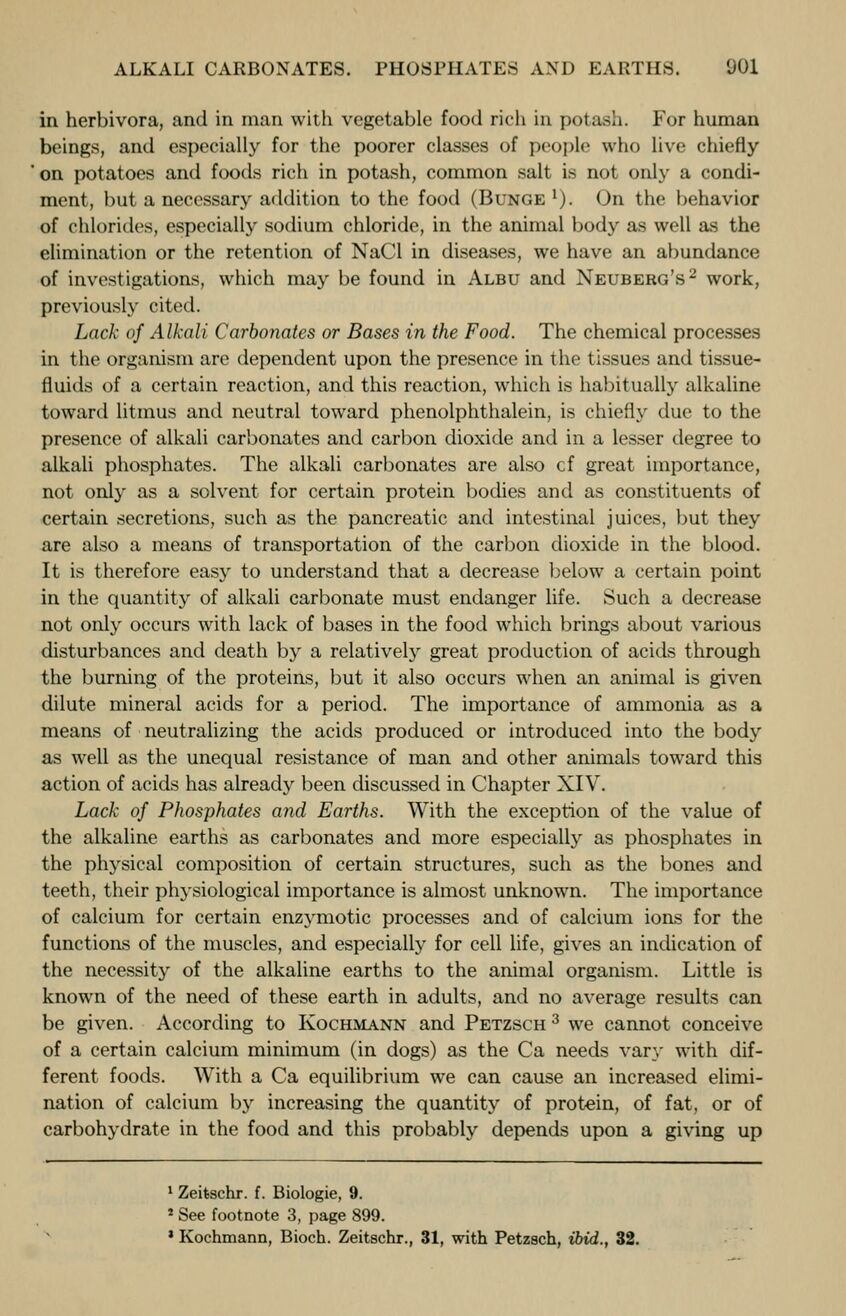
Full resolution (JPEG) - On this page / på denna sida - XVII. Metabolism - II. Metabolism in Starvation and with Insufficient Nutrition

<< prev. page << föreg. sida << >> nästa sida >> next page >>
Below is the raw OCR text
from the above scanned image.
Do you see an error? Proofread the page now!
Här nedan syns maskintolkade texten från faksimilbilden ovan.
Ser du något fel? Korrekturläs sidan nu!
This page has never been proofread. / Denna sida har aldrig korrekturlästs.
ALKALI CARBONATES. PHOSPHATES AND EARTHS. (
J01
in herbivora, and in man with vegetable food rich in potash. For human
beings, and especially for the poorer classes of people who live chiefly
on potatoes and foods rich in potash, common salt is not only a condi-
ment, but a necessary addition to the food (Bunge l
). On the behavior
of chlorides, especially sodium chloride, in the animal body as well as the
elimination or the retention of NaCl in diseases, we have an abundance
of investigations, which may be found in Albu and Neuberg’s 2
work,
previously cited.
Lack of Alkali Carbonates or Bases in the Food. The chemical processes
in the organism are dependent upon the presence in the tissues and tissue-
fluids of a certain reaction, and this reaction, which is habitually alkaline
toward litmus and neutral toward phenolphthalein, is chiefly due to the
presence of alkali carbonates and carbon dioxide and in a lesser degree to
alkali phosphates. The alkali carbonates are also cf great importance,
not only as a solvent for certain protein bodies and as constituents of
certain secretions, such as the pancreatic and intestinal juices, but they
are also a means of transportation of the carbon dioxide in the blood.
It is therefore easy to understand that a decrease below a certain point
in the quantity of alkali carbonate must endanger life. Such a decrease
not only occurs with lack of bases in the food which brings about various
disturbances and death by a relatively great production of acids through
the burning of the proteins, but it also occurs when an animal is given
dilute mineral acids for a period. The importance of ammonia as a
means of neutralizing the acids produced or introduced into the body
as well as the unequal resistance of man and other animals toward this
action of acids has already been discussed in Chapter XIV.
Lack of Phosphates and Earths. With the exception of the value of
the alkaline earths as carbonates and more especially as phosphates in
the physical composition of certain structures, such as the bones and
teeth, their physiological importance is almost unknown. The importance
of calcium for certain enzymotic processes and of calcium ions for the
functions of the muscles, and especially for cell life, gives an indication of
the necessity of the alkaline earths to the animal organism. Little is
known of the need of these earth in adults, and no average results can
be given. According to Kochmann and Petzsch 3
we cannot conceive
of a certain calcium minimum (in dogs) as the Ca needs vary with dif-
ferent foods. With a Ca equilibrium we can cause an increased elimi-
nation of calcium by increasing the quantity of protein, of fat, or of
carbohydrate in the food and this probably depends upon a giving up
1
Zeitschr. f . Biologie, 9.
* See footnote 3, page 899.
* Kochmann, Bioch. Zeitschr., 31, with Petzsch, ibid., 32.
<< prev. page << föreg. sida << >> nästa sida >> next page >>